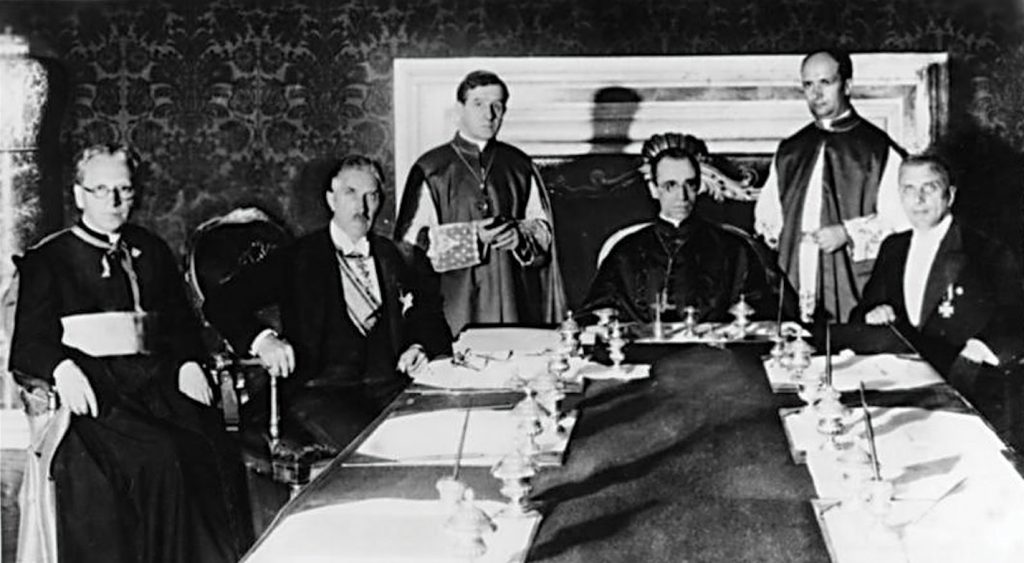
Published September 20, 2018
Eighty-five years ago, on July 20, 1933, a concordat defining the legal position of the Catholic Church in the Third Reich was signed by Vatican secretary of state Cardinal Eugenio Pacelli (later Pope Pius XII) and German vice chancellor Franz von Papen. The Reischskonkordat was then ratified by the Nazi-dominated German parliament some six weeks later, on September 10. Pope Pius XI, under whose authority Cardinal Pacelli had negotiated this treaty, was under no illusions about German National Socialism; he detested its racial ideology. And unlike some Vatican diplomats who seem to have imagined that the Third Reich would be a short-run thing, the pope likely thought that Hitler and his gangsters would be in power for some time. So he wanted to negotiate legal protections for the Church so that it could operate pastorally under a totalitarian regime that, with the passage of the notorious “Enabling Act” of March 23, had assumed virtually dictatorial powers. That one condition for the Reichskonkordat was the de facto destruction of the Catholic-based Center Party was evidently a price Pius XI thought worth paying if the result were the protection of Catholic institutions and pastoral life.
This legal-diplomatic strategy — which seems to have been based on the belief that even a totalitarian regime would honor a treaty commitment — didn’t work. The Third Reich began violating the Reichskonkordat shortly after the ink dried on the treaty. Then after some two dozen stiff diplomatic notes to Berlin (drafted by Pacelli) had not produced results, an irate Pius XI issued the encyclical Mit brennender Sorge [With Burning Concern] in 1937, had it clandestinely printed in Germany, and ordered that it be read from all German pulpits. In the encyclical, Pius denounced an “idolatrous cult” that replaced belief in God with a “national religion” and a “myth of race and blood,” and his stress on the perennial value of the Old Testament made it quite clear what he thought of the Nazi swastika and what it represented.
It is beyond ironic, and it borders on the scandalous, that the lesson of this debacle — paper promises mean nothing to totalitarians — has not been learned in the Vatican, which now appears to be on the verge of repeating its mistake by completing a deal with the government of the People’s Republic of China, on the 85th anniversary of the Reichskonkordat.
Vatican sources are calling the deal “a historic breakthrough,” but the only thing “historic” about it is the inability of Vatican diplomacy to learn from history. To make matters worse, others in the Vatican are conceding that the deal is “not a good agreement” but then go on to suggest that it might pave the way for something better in the future. Really? Haven’t we been down that road before? Isn’t the failed Reichskonkordat a cautionary tale? Is history taught at the Pontifical Ecclesiastical Academy, the Church’s graduate school for papal diplomats?
According to the deal as described in various media sources, candidates for bishop in China will be chosen by the priests and laity of a diocese, from a list of potential bishops presented by Chinese authorities. The result of these “elections” will be sent to Beijing, which will then submit a candidate to the Vatican. Rome will then have time to check out the nominee, which it can accept or decline. If it’s the latter, a “dialogue” will ensue, presumably to get Beijing to submit another name. But that other name will have been produced by the same rigged system, for it is impossible to imagine that any candidate proposed by the Chinese authorities at the local level will not have been thoroughly vetted for reliability as a Communist puppet.
As described in press reports, this deal is a clear violation of current Church law. Canon 377.5 in the Code of Canon Law states flatly that “no rights or privileges of election, appointment, presentation, or designation of bishops are conceded to civil authorities” — an unambiguous stipulation that gives legal form to the teaching of the Second Vatican Council in its Decree on the Pastoral Office of Bishops in the Church. Even worse, responsibility for Church affairs in the PRC has now been taken from the Chinese state and given to a bureau of the Chinese Communist Party — which means that the Vatican is proposing to give a right of “presentation . . . of bishops” to Communist bureaucrats, whose interests, it may be safely assumed, are not those of the Church and its mission of evangelization.
Worse still, in terms of the eroding moral authority of a Vatican fumbling its response to clerical sexual abuse and malfeasant bishops, this reported deal comes at a time when the Chinese government is ramping up the persecution of religious groups throughout China, demolishing Catholic churches, stripping others of religious statues, consigning leaders of Protestant house churches to slave-labor camps, and conducting what some regard as a campaign of genocide against the Uighur Muslims. China intensifies religious persecution and the Vatican signs an agreement with the PRC? Please.
As for the notion that this deal will help bridge the gap between a largely underground Catholic Church loyal to the bishop of Rome and the regime-sponsored Patriotic Catholic Association (PCA), there is no known voice from the persecuted Church in China that supports the proposed agreement. Why? Because the persecuted Church knows that the PCA is, functionally, a regime tool, even if some of its clergy (including bishops) are, in their hearts, loyal to Rome. It doesn’t take rocket science to figure out that a deal whereby Communist-party authorities “nominate” bishops through faux elections conducted by PCA-approved bodies from candidate lists prepared by other Communist authorities is a deal that further empowers the PCA while disempowering the persecuted Church.
So why is this happening? Two explanations occur.
The first is that this misbegotten deal represents the continuing influence in Vatican diplomacy of the Casaroli Gang — the disciples of the late Cardinal Agostini Casaroli, architect of the 1970s Vatican Ostpolitik, which was supposed to make life better for persecuted Catholics behind the Iron Curtain through deal-making with Warsaw Pact regimes. The Ostpolitik did nothing of the sort. It turned the Hungarian Church into a wholly owned subsidiary of the Hungarian Communist party; it did serious damage to the Church in what was then Czechoslovakia; and it facilitated the deep penetration of the Vatican itself by East Bloc intelligence agencies. This massive policy failure has been quite well documented with materials from former Warsaw Pact secret-police archives. I have written about it extensively, in books readily available in Italian. Yet not a murmur of dissent from the legend of Casaroli the Great is permitted in important Roman circles. And it is second- and third-generation Casaroli acolytes who are the drivers of the reported China deal. They are, it seems, uneducable.
Then there is Pope Francis. John Paul II gave the Catholic Church real moral leverage in world politics. Benedict XVI offered the post–Cold War incisive commentaries on the political challenges of the 21st century. That legacy has been squandered through one ill-advised move after another over the five and a half years of this pontificate: a Syrian initiative that gave President Obama an excuse not to enforce his putative “red line” and thus strengthened the murderous Assad regime; disastrous and counterproductive kowtowing to the Maduro regime in Venezuela and the Communist dictatorship in Cuba that has demoralized the opposition in both countries; a refusal to use the words “invasion” in reference to Crimea and “war” in reference to what Russia is doing in eastern Ukraine; an approach to Russian Orthodoxy that refuses to concede that the Church’s principal interlocutors in that “dialogue” are agents of Russian state power first, and churchmen somewhere down the line; an absolutist approach to the migrant crisis in Europe that has shrunk the space in which a reasonable political compromise could take shape; a lot of papal moral capital expended on ephemera like the threat posed by plastic bottles and straws in the oceans. Mistake after mistake, now seemingly on the verge of being compounded by the betrayal of persecuted Catholics in China through a deal that empowers the Chinese Communist party in its efforts to make the Church an instrument of the state.
The pope could still call a halt to this, and he should. A bad deal in these circumstances is far worse than no deal, for a bad deal further compromises the moral authority of the Church, which is then further weakened in its evangelical mission. That is the lesson that should have been learned from the Reichskonkordat of 1933. Eighty-five years later, it is long past time for Vatican diplomacy to get on a learning curve.
George Weigel is the distinguished senior fellow of the Ethics and Public Policy Center.




